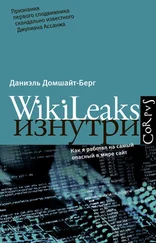Harding, Luke - WikiLeaks - Inside Julian Assange's War on Secrecy
Здесь есть возможность читать онлайн «Harding, Luke - WikiLeaks - Inside Julian Assange's War on Secrecy» весь текст электронной книги совершенно бесплатно (целиком полную версию без сокращений). В некоторых случаях можно слушать аудио, скачать через торрент в формате fb2 и присутствует краткое содержание. Жанр: Старинная литература, на английском языке. Описание произведения, (предисловие) а так же отзывы посетителей доступны на портале библиотеки ЛибКат.
- Название:WikiLeaks: Inside Julian Assange's War on Secrecy
- Автор:
- Жанр:
- Год:неизвестен
- ISBN:нет данных
- Рейтинг книги:3 / 5. Голосов: 1
-
Избранное:Добавить в избранное
- Отзывы:
-
Ваша оценка:
- 60
- 1
- 2
- 3
- 4
- 5
WikiLeaks: Inside Julian Assange's War on Secrecy: краткое содержание, описание и аннотация
Предлагаем к чтению аннотацию, описание, краткое содержание или предисловие (зависит от того, что написал сам автор книги «WikiLeaks: Inside Julian Assange's War on Secrecy»). Если вы не нашли необходимую информацию о книге — напишите в комментариях, мы постараемся отыскать её.
WikiLeaks: Inside Julian Assange's War on Secrecy — читать онлайн бесплатно полную книгу (весь текст) целиком
Ниже представлен текст книги, разбитый по страницам. Система сохранения места последней прочитанной страницы, позволяет с удобством читать онлайн бесплатно книгу «WikiLeaks: Inside Julian Assange's War on Secrecy», без необходимости каждый раз заново искать на чём Вы остановились. Поставьте закладку, и сможете в любой момент перейти на страницу, на которой закончили чтение.
Интервал:
Закладка:
WikiLeaks had also spawned a host of clone sites which were not so much competitors as admiring tributes: IndoLeaks, BrusselsLeaks, BalkanLeaks, ThaiLeaks, PinoyLeaks. Some were reposting American embassy cables. Others were publishing material from their own sources. Assange’s concept of an online site for anonymous whistleblowing activists seemed to be going viral – as, perhaps, he always believed it might – while he continued his own plan to spend months sending leaked cables to journalists in an ever-widening range of countries.
One of the most interesting – and subtle – immediate positive outcomes of the WikiLeaks saga was in one of those normally obscure countries. Following the publication of excoriating leaked cables from the US mission in Tunisia, about the corruption and excess of the ruling family, tens of thousands of protesters rose up and overthrew the country’s hated president, Zine al-Abidine Ben Ali.
Was this a WikiLeaks revolution? Not quite. It began after an unemployed 26-year-old university graduate, Mohammed Bouazizi, set fire to himself in desperation. Officials had prevented him from selling vegetables. His death triggered nationwide rioting over joblessness and political repression. It was long-simmering frustrations with the Ben Ali regime which were behind the revolt. The Tunisians were the first people in the Arab world to take to the streets and oust a leader for a generation. But they already knew their ruling family was debauched; they didn’t need WikiLeaks for that.
There was, however, a genuinely extraordinary WikiLeaks effect. “Sam”, a pseudonymous young Tunisian writing on the Guardian ’s Comment is Free site in mid-January, specifically referenced WikiLeaks as he described how a resigned cynicism about the regime under which he’d grown up turned to hope:
The internet is blocked, and censored pages are referred to as pages “not found” – as if they had never existed. Schoolchildren are exchanging proxies and the word becomes cult: “You got a proxy that works?” … We love our country and we want things to change, but there is no organised movement: the tribe is willing, but the leader is missing. The corruption, the bribes – we simply want to leave. We begin to apply to study in France, or Canada. It is cowardice, and we know it. Leaving the country to “the rest of them”. We go to France and forget, then come back for the holidays. Tunisia? It is the beaches of Sousse and Hammamet, the nightclubs and restaurants. A giant Club Med.
And then, WikiLeaks reveals what everyone was whispering. And then, a young man immolates himself. And then, 20 Tunisians are killed in one day. And for the first time, we see the opportunity to rebel, to take revenge on the “royal” family, who have taken everything, to overturn the established order that has accompanied our youth. An educated youth, which is tired and ready to sacrifice all the symbols of the former autocratic Tunisia with a new revolution: the jasmine revolution – the true one.
Paradoxically the leaked comments by the US ambassador in Tunis, widely read across the region, played a major role in boosting Washington’s image on the Arab street. Ordinary Tunisians liked the way in which the Americans – unlike the French – had so frankly highlighted corruption. They now wanted the US to support their on-going jasmine revolution. They asked Washington to exert pressure on neighbouring Arab leaders, and prevent them from interfering.
Muammar Gaddafi, the despot in neighbouring Libya, had no problem in acknowledging a link between events in Tunis and WikiLeaks – a demonic link, so far as he was concerned. Gaddafi said he was pained by Ben Ali’s overthrow and “concerned for the people of Tunisia, whose sons are dying each day”. He warned Tunisians not to be tricked by WikiLeaks, “which publishes information written by lying ambassadors in order to create chaos”.
The US secretary of state, Hillary Clinton, had previously denounced the leak of the cables, because it had “undermined our efforts to work with other countries to solve shared problems”. But the same leak was now helping to repair America’s battered reputation in the Middle East, damaged by the Iraq war, and to advance the White House’s lofty goals of democratisation and modernisation. Assange may have regarded the US as his enemy, but in this case he had unwittingly helped restore American influence in a place where it had lost credibility. It was ironic. By increasing the amount of information in the system, WikiLeaks had generated unpredictable effects.
For all the ironies and ambiguities of his campaign, and for all the problematic nature of his personality, Assange himself now seems to have acquired a vast worldwide fan-base – at any rate, outside the United States. Despite the hostility of government officials, and the “latex gloves” (as Vanity Fair put it) with which the mainstream media have handled him, much of the world has nothing but admiration for WikiLeaks and Julian Assange. In his native Australia and elsewhere he is regarded by many unreservedly as a hero, as someone whose war on secrecy has created something genuinely new and exciting.
His own preferences remain subversive. He personally helped fund a humorous rap video about WikiLeaks which he plays to the visitors to Ellingham Hall, tapping out the address on his MacBook Pro. It is by Robert Foster, a performance poet living in Australia. The spoof news bulletin is titled, “RAP NEWS – WikiLeaks’ Cablegate: the truth is out there.” Foster raps while dressed up in a variety of roles: TV anchor, Hillary Clinton, Silvio Berlusconi, and Gadaffi, as well as the right-wing conspiracy theorist and American radio host Alex Jones. A voluptuous blonde nurse with a stethoscope sidles up to Gadaffi. Meanwhile, Berlusconi, flanked by two young women in underwear, says: “Hey Robert, how much for your news show? I pay cash! I just got some roubles!”
Assange loves this stuff: as it plays, he can be seen smiling and wiggling his feet to the music. There is something else which has also recently given him pleasure: Italy’s Rolling Stone magazine made him their cover-boy, depicting him – shirtless – with the legend, in a nod to David Bowie, “The Man who Fell (from the web) to Earth … a platinum villain who endangers the powerful of the planet, passing himself off as a cyberpunk”. The magazine named him “Rockstar of the Year”.
APPENDIX
US Embassy Cables
To read all the cables published by the Guardian , visit www.guardian.co.uk/wikileakscablesdatabase
TUNISIA - A US FOREIGN POLICY
CONUNDRUM
Friday, 17 July 2009, 16:19
S E C R E T SECTION 01 OF 05 TUNIS 000492
NOFORN
SIPDIS
DEPT FOR NEA AA/S FELTMAN, DAS HUDSON, AMBASSADOR-DESIGNATE GRAY, AND NEA/MAG FROM AMBASSADOR
EO 12958 DECL: 07/13/2029
TAGS PREL, PGOV, ECON, KPAO, MASS, PHUM, TS
SUBJECT: TROUBLED TUNISIA: WHAT SHOULD WE DO?
Classified By: Ambassador Robert F. Godec for E.O. 12958 reasons 1.4 (b ) and (d).
Summary
1. (S/NF) By many measures, Tunisia should be a close US ally. But it is not. While we share some key values and the country has a strong record on development, Tunisia has big problems. President Ben Ali is aging, his regime is sclerotic and there is no clear successor. Many Tunisians are frustrated by the lack of political freedom and angered by First Family corruption, high unemployment and regional inequities. Extremism poses a continuing threat. Compounding the problems, the GOT brooks no advice or criticism, whether domestic or international. Instead, it seeks to impose ever greater control, often using the police. The result: Tunisia is troubled and our relations are too.
Читать дальшеИнтервал:
Закладка:
Похожие книги на «WikiLeaks: Inside Julian Assange's War on Secrecy»
Представляем Вашему вниманию похожие книги на «WikiLeaks: Inside Julian Assange's War on Secrecy» списком для выбора. Мы отобрали схожую по названию и смыслу литературу в надежде предоставить читателям больше вариантов отыскать новые, интересные, ещё непрочитанные произведения.
Обсуждение, отзывы о книге «WikiLeaks: Inside Julian Assange's War on Secrecy» и просто собственные мнения читателей. Оставьте ваши комментарии, напишите, что Вы думаете о произведении, его смысле или главных героях. Укажите что конкретно понравилось, а что нет, и почему Вы так считаете.












